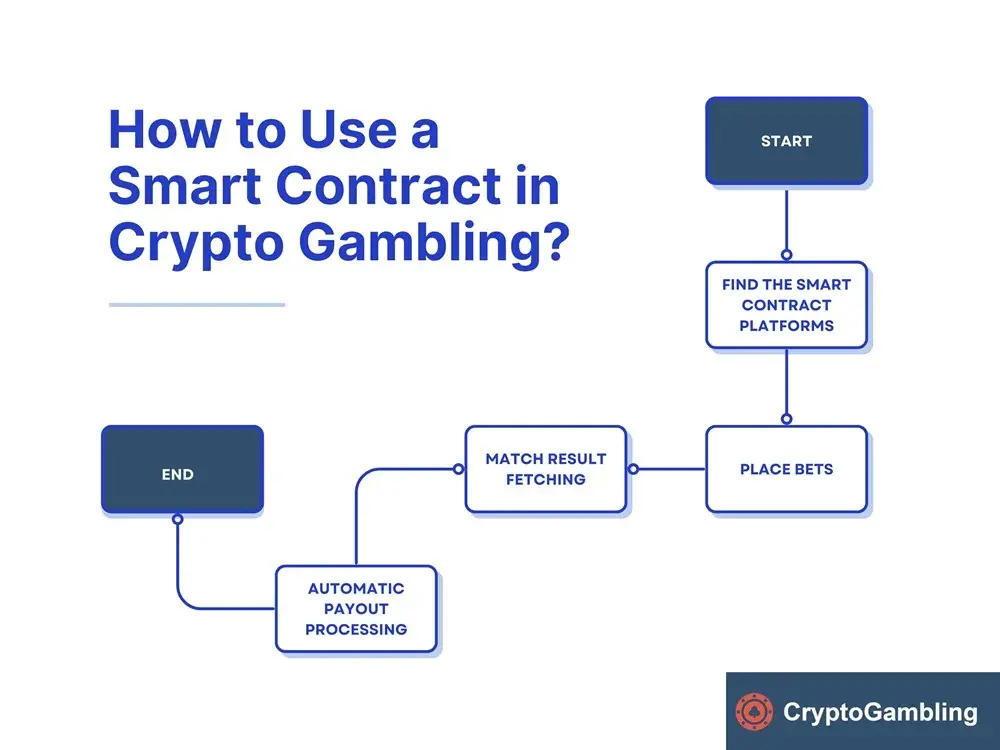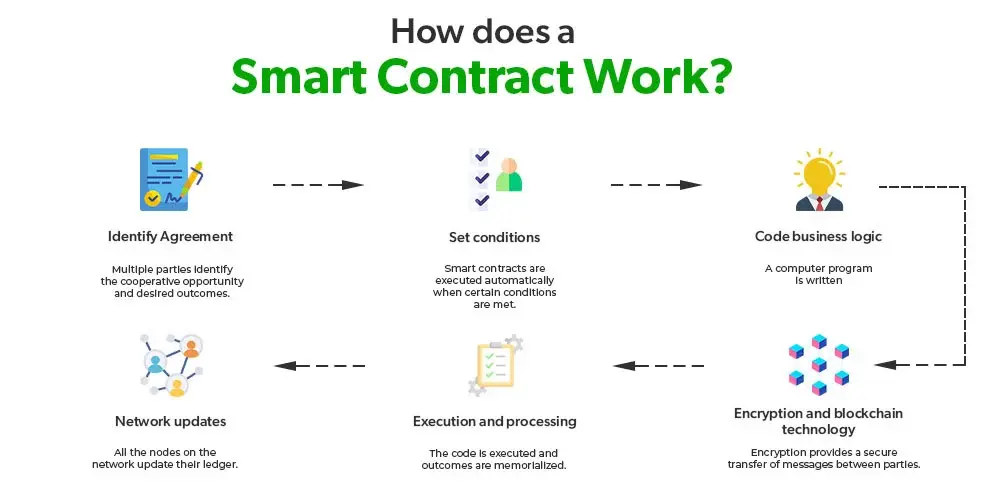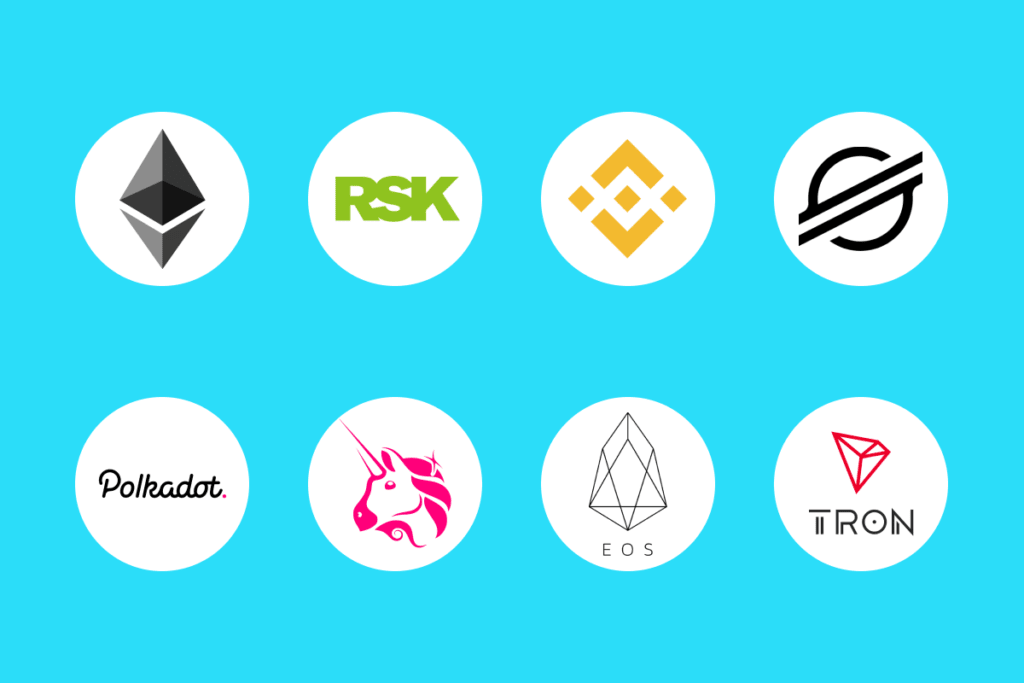Transforming Crypto Gambling: Smart Contracts in 2025
Find how smart contracts are transforming crypto gambling with instant payouts, transparency, and security. Learn about their advantages, use cases, challenges, and future trends in decentralized betting.

Crypto gambling is rapidly transforming online betting. According to the MarketsandMarkets report, the blockchain gambling industry is expected to grow from USD 20.1 billion to USD 248.9 billion by 2029.
There are many reasons behind the rise of blockchain-based gambling. It combines the fun and versatility of online casino games with transparency and security offered by blockchain technology. It ensures fair play in each game, building trust between the players and the games.
Interestingly enough, the adoption of self-executing agreements will further accelerate trust between players and operators.
But what is a crypto smart contract? How does it ensure fairness in crypto casinos? More importantly, how is it revolutionizing gambling?
Today, we are taking a deep dive into a next-generation smart contract & decentralized application platform to understand better their function, advantages, challenges, and future beyond 2025.
What are Smart Contracts in Crypto?

Smart contracts are blockchain-based self-executing digital programs that are automatically executed when specific terms and conditions are met. Compared to a traditional contract, there is no need for an intermediary third party to oversee the transaction and execution.
The lack of third-party is beneficial for both gamblers and gambling operators.
The legal smart contracts certify that each game is fair thanks to its automated and tamper-proof outcomes, ensuring players get instant payouts upon winning without any intervention or manipulation. Whereas, gambling operators can reduce operational costs without compromising the security and trust of the platform.
Ethereum (ETH), Binance Smart Chain (BSC), Solana (SOL), and Cardano (ADA) are some of the popular smart contracts crypto list. Among them, the Ethereum smart contract is supported by many decentralized betting platforms.
How Smart Contract Works in Crypto?
Blockchain technology enables contracts based on code-based agreements to automatically carry out their expressed terms. The code-based framework executes and enforces contracts without involving the intervention of any third-party representatives. A smart contract functions in the crypto universe in six straightforward steps.

1. Parties Agree to Terms and Conditions
Every party participating in the contract needs to specify and mutually accept the exact terms of the agreement during its establishment. The agreement must establish all necessary obligations together with rights and established penalties. The implementation of precise language during this phase becomes essential since the code directly reflects the intended smart contract operation to prevent misunderstandings.
2. The Smart Contract Is Created
The development process starts with a term definition agreement before developers use compatible programming languages such as Solidity for Ethereum to create the smart contract code. The code that is written includes all the terms and conditions that outline the operational limits of the contract. The accuracy of this code is a critical factor because bugs can lead to unintended consequences or loopholes.
3. The Smart Contract Is Deployed to a Blockchain
The blockchain network receives the smart contract for deployment after the completion of coding. During deployment, the contract broadcasts to the network to become a permanent part of the blockchain immutable ledger. The deployed contract maintains unchanging status since deployment because it blocks any modifications or revocations thus creating transparent relationships between parties. Proper testing before deployment becomes essential because of the smart contract's unalterable nature.
4. Triggering Conditions Are Met
A smart contract stays inactive until specific conditions defined within the program get activated. The specified contract triggers include dates and payments together with any verifiable events that both parties have established in their contractual terms. The contract triggers actions only after detecting that predefined conditions become true by continuously checking blockchain data and external data sources through oracles.
5. The Smart Contract Is Executed
The predefined actions inside the smart contract automatically run when triggering conditions become true. The contract executes activities such as fund transfers along with ownership registration and other activities as agreed upon by the two parties. The automation system removes the utilization of intermediaries, and this serves to reduce delays and processing costs caused by manual handling. The inbuilt self-execution feature guarantees complete adherence to the terms of a contract by all parties involved.
6. The Contract Result Is Recorded to Blockchain
It holds all the outputs of contracts after execution. All the transactions are given permanent transparency because it makes an irreversible entry that is accessible to all network members. Blockchain decentralization offers total record security and tamper-proofing that maintains contractual integrity and establishes trust between concerned parties.
How to Use a Smart Contract in Crypto Gambling?
Let’s understand it by using a simple example of two players betting on a live cricket match between Canada and the United States in a T20 match.
The following is the step-by-step breakdown of the working of smart contracts in gambling.
Step 1. Finding the Smart Contract Platforms

To bet on a live cricket match, players must select crypto casino platforms with deployed contracts on sports betting with support for smart contract coins.
Example: The contract will accept bets from players with specified match outcomes like “Canada wins” or “the United States wins”.
Step 2. Placing Bets
After selecting the supported betting platform, players can place bets by sending cryptocurrency to the smart contract wallet from their crypto coins.
Example: Player One bets 2 ETH on Canada winning and Player Two bets 2 ETH on the United States winning. Here, the self-executing digital contract locks 4 ETH in its balance.
Step 3. Match Result Fetching
After the match, the blockchain-based protocol fetches the official result of the match from a reliable source using solutions like oracles. Oracles are tools that fetch off-chain data, like match results, and make it available to automated contracts.
Example: Canada wins by 5 wickets (Confirmed result from ESPN API).
Step 4. Automatic Payout Processing
The automated agreement verifies the result from a reliable Oracle channel and distributes the winnings instantly and automatically.
Example: The contract transfers the winnings to the Player One account, loading 3.9 ETH instantly into his crypto wallet. In this specific scenario, the platform takes 0.1 ETH as a small platform fee for providing the service.
Popular Crypto Smart Contract Platforms
| Platform | Programming Language | Transaction Speed | Advantages | Industry-Specific Use Case |
|---|---|---|---|---|
| Ethereum | Solidity | 12-15 seconds/block | Strongest developer community, flexible, secure | DeFi, dApps, NFT marketplaces |
| Polkadot | Substrate | 6 seconds/block | Interoperability, fast processing | Cross-chain apps, decentralized networks |
| Hyperledger | Go, Java, JavaScript | Varies (customizable) | Enterprise-level security and control | Supply chain, finance, healthcare |
| Cardano | Plutus | 20 seconds/block | Research-driven, secure, low fees | Healthcare, finance, supply chain |
| Solana | Rust | 65,000 transactions/s | Extremely fast, highly scalable | DeFi, NFT marketplaces |
| Binance Smart Chain (BSC) | Solidity | 3 seconds/block | Low fees, fast transactions | DeFi, dApps, token exchanges |
| Tezos | Michelson | 30 seconds/block | Secure, flexible governance | On-chain governance, digital art, finance |
| Stellar | Simple Contracts | 3-5 seconds/transaction | Fast finality, low transaction costs | Cross-border payments, remittances |
| Polygon | Solidity | 2 seconds/block | High throughput, low fees | dApps, DeFi, Layer 2 solutions |
| Algorand | Teal, Python | Under 4 seconds/block | Fast finality, sustainable, low energy usage | Finance, government, sustainability |
Popular Smart Contracts Use Cases in Crypto Gambling
Decentralized contracts have been implemented in various crypto-gambling platforms. Here are some of the popular applications of crypto contracts.
Decentralized Casinos: Decentralized casinos implement digital contracts to automate bets and payouts. Moreover, it ensures trust and transparency, eliminating any kind of potential disputes.
Blockchain-Based Sports Betting: Ethereum smart contracts allow players to bet on real-world events directly. By removing intermediaries, these blockchain protocols further reduce fees while increasing transparency.
Provably Fair Games: Blockchain contracts implement Provably Fair Games, utilizing publicly verifiable blockchain-based Random Number Generators (RNGs) to ensure genuine randomness to prevent any tampering or manipulation.
Advantages of Smart Contracts in Crypto Gambling
It is important to note the benefits that crypto contracts have brought to the industry.
While the adoption of self-executing contracts in decentralized gambling will continue to evolve in the market, the following key benefits of smart contracts should be acknowledged.
Fair Play and Transparency
Immutable contracts prevent any odds manipulation, ensuring fair play and transparency.
Unlike a traditional gambling casino, trusted blockchain-based casinos have a provably fair system in place. This enforces transparent gameplay that is random and fair, where the results cannot be altered or modified by third parties.
Instant and Secure Transactions
Creating automated contracts eliminates the need for manual transactions, removing the delay and dependency on middlemen.
The contract is executed automatically when the predefined conditions are met. The payouts are always self-executing, instantaneous, and secure.
More importantly, the lack of intermediaries provides additional benefits like lower operational costs for the operators and low service fees for the players.
Anonymity and Security
Blockchain-based contracts allow players to play online casino games without disclosing personal information. These secured contracts do not store any sensitive user information, promoting security, privacy, and anonymity.
Despite prioritizing user privacy, the autonomous script maintains its authenticity with immutable transaction records. It prevents any unauthorized manipulation, data theft, and security risks.
Decentralization & Player Autonomy
A decentralized autonomous program means there is no central authority or middlemen. This gives players complete control over their funds until the bets are settled.
In sharp contrast, players have to trust traditional casinos when handing over their funds since it is based on a centralized system.
Limitations of Smart Contracts in Crypto Gambling
While blockchain contracts have evolved crypto gambling, they are still not perfect. The following are some of the unique limitations of such contracts. However, it is essential to address such limitations through user awareness, regulatory participation, and security advancement.
Lack of User Awareness
It is difficult to comprehend the complexity and technicality of blockchain technology, especially for new players. The lack of education and awareness of such decentralized platforms may give rise to outrageous misconceptions. Unfortunately, such misconceptions might further hinder the adoption of crypto contracts.
Therefore, it is important to create awareness about blockchain gambling through different resources to encourage broader participation.
Regulatory Uncertainty
The regulatory uncertainty surrounding blockchain technology remains largely unchanged. The regulatory definitions and legality vary by country, increasing the compliance complexity for cross-border platforms.
To solidify confidence in smart agreements, it is important to develop regulatory frameworks for compliant operation and long-term player safety.
Potential Security Risks
The immutable nature of self-executing digital contracts is prone to potential security risks. So, these contracts must implement different verification and security audits to identify and prevent such risks.
Example:
According to the VICE article, the Ethereum-based game "Fomo3D" experienced a vulnerability in 2018. An attacker manipulated the smart contract by clogging the Ethereum blockchain. The attacker manipulated the blockchain to ensure they became the last keyholder, winning approximately $3 million jackpot.
Scalability Issue
The instantaneous transactions of crypto agreements do pose a challenge in a large-scale implementation. The larger transactions directly impact the network congestion, increasing processing time with higher transaction fees.
A new player cannot justify paying $100 per transaction to make small bets during peak congestion time.
Therefore, it is important to implement Layer 2 solutions for scaling cryptocurrencies in gambling. These solutions improve scalability by processing and validating transactions off-chain before adding them to the main chain.
Future of Smart Contracts in Crypto Gambling
Automated contracts continue to evolve the crypto casino industry with the latest innovations in blockchain for a brighter future. However, the revolutionary nature of crypto gaming leaves room for potential advancement.
With the advancement of Artificial Intelligence, the crypto-gambling platform will likely integrate AI-driven programs for improved risk assessment and fraud detection and support for multiple coinbase crypto wallets.
It can be used to detect any suspicious activities like cheating or abuse.
Another key advancement will likely happen with cross-border operability. There will be an adoption of interoperability between blockchains, allowing for a seamless betting experience across multiple blockchains.
With the advancement of crypto gambling, there will be a focus on developing clearer regulatory frameworks with more countries developing blockchain-specific regulations for online gambling.
Conclusion
Smart crypto contracts are the next-generation revolution of decentralized application platforms. Such decentralized automation will revolutionize the gambling industry by introducing automation, transparency, and fairness to online betting.
It eliminates intermediaries to ensure provably fair gaming for fast settlements. The security enhancement gives players greater control and trust in decentralized platforms.
Despite their advantages, challenges such as regulatory uncertainty, security risks, scalability issues, and lack of user awareness remain. However, with continuous advancements in blockchain technology, solutions like Layer 2 scaling, AI-driven fraud detection, and cross-chain interoperability are paving the way for a more efficient and accessible gambling ecosystem.
Looking ahead, the integration of AI, clearer regulatory frameworks, and metaverse gaming experiences will further shape the future of crypto gambling. As blockchain adoption grows, making money with smart contracts will become popular. It will play a pivotal role in making online betting more transparent, secure, and innovative—shaping a new era of decentralized gaming.
Some common questions
Q. What is a smart contract in crypto?
A. It is a self-executing program that is automatically executed when specific terms and conditions are met.
Q. Are crypto-based smart contracts legally binding?
A. The legality of crypto-based smart contracts depends on the jurisdiction. A legal smart contract has to meet all the legal requirements of a contract to be legally binding.
Q. How do I know if a smart contract casino is safe?
A. You should always check for open-source code that performs independent audits with provably fair mechanisms in place.
Q. What happens if a smart contract is hacked?
A. If the contract is hacked, the vulnerability can be exploited. The hacker may steal the funds locked in the contract. That is why, it is important to choose platforms with strong security audits.
Q. Can I withdraw winnings instantly with smart contracts?
A. Yes, automated agreements allow for automatic payouts without requiring approval from an operator or intermediary.
Q. What is the best smart contract crypto for gambling?
A. Ethereum is the most widely used blockchain-based contract for gambling. Other blockchains include Binance Smart Chain, Solana, and TRON.
Q. Can smart contracts be changed?
A. No, crypto contracts are immutable once deployed to the network.












